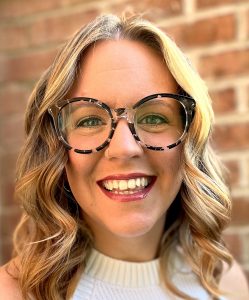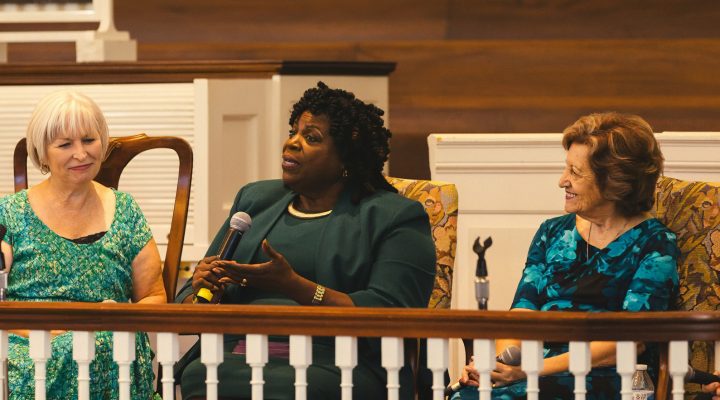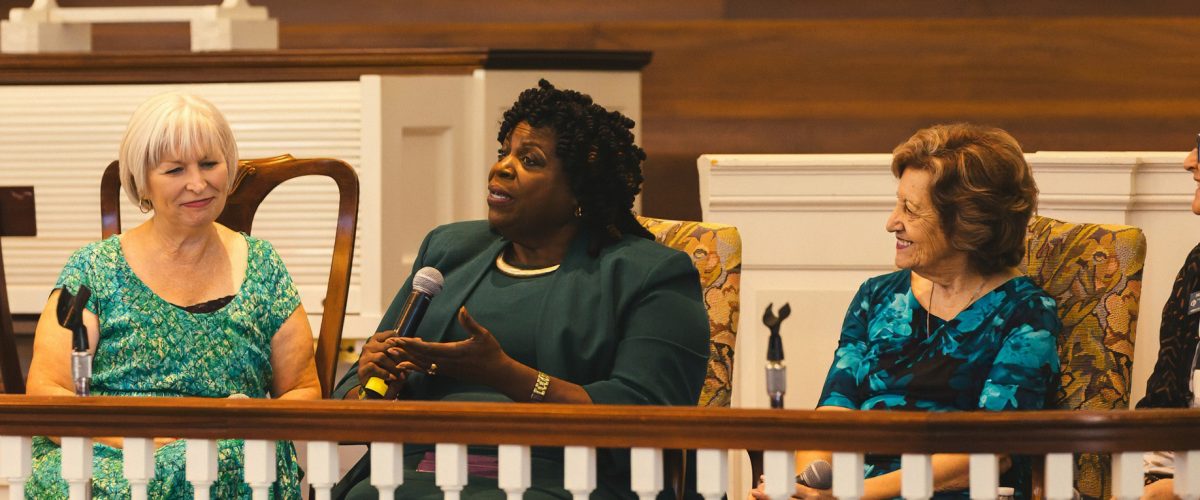There is something inherently beautiful about gathering with Baptist Women in Ministry. The stories we share with one another are sometimes heartbreaking, sometimes hilarious and often a little bit of both.
We giggle our way through stories of the inappropriate behavior of church members or supervisors we’ve encountered over the years. We belly laugh as we recount the times our mic packs have fallen off whatever tiny, woman-sized pant pocket we have attempted to shove them in. We share tips for how to baptize a man who is twice your own size and agree the waders just don’t work most of the time.
Gathering in Louisville last week was particularly special, as we heard directly from our foremothers about the experience of creating BWIM in 1983 and the immediate backlash they received in 1984. I cannot stress enough, if you have an opportunity to attend or host a viewing of the documentary Midwives of a Movement, you must do so. Our history matters, and we had an opportunity last week to thank those who blazed a trail.
“Our history matters, and we had an opportunity last week to thank those who blazed a trail.”
I believe the most impressive moment of that documentary is when the foremothers acknowledge the voices they left out in their trailblazing. They openly admit they failed to include women of color or LGBTQ people in their meetings and movement. When given the opportunity after viewing the documentary to offer words of thanks to the foremothers in the room, I thanked them for being an example of those who are dedicated to learning through their whole lives and to continue to learn now.
“Do the best you can until you know better. Then, when you know better, do better.” These words from Maya Angelou rang in my heart over and over through the three days together, but especially at that moment. The women who were featured in the documentary are a beautiful example of a desire to know better and to do better.

Val Fisk
And BWIM is doing better. Of the four women who preached and spoke in plenary sessions, only one was white. I am grateful for the voices of Carolyn Gordon, Alicia Sedaca Zorzoli and Zina Jacque. I feel blessed to sit at their feet and learn from these women of color. I am excited to see the launch of Sisters of Solidarity mentoring cohort and all the Black women in those cohorts will gain in future years as a result of the experience.
But my sisters and siblings, we have so far to go. Honoring all that has come from the work of the past 40 years was important, and the women we celebrated certainly deserved the celebration. However, we took almost no time during this three-day gathering to look forward. It felt much like we were standing at the Jordan River, having survived 40 years in the wilderness, and here we are, Israelites still looking back to celebrate leaving Egypt, rather than listening to those who will lead us across the river to Gilgal and Jericho.
Meredith Stone, executive director of BWIM, is a dear friend and mentor to me, and I was disappointed we did not hear more from her about what will be done in the future as BWIM continues to grow and expand. Under her leadership in the past three years, BWIM has been able to expand paid staff positions, added new programs such as Sisters of Solidarity, and now surpassed the $500,000 fundraising goal of the Multiply campaign. What further programs and resources can we expect to see BWIM launch? How can we offer support to make the vision a reality?
The lack of openly queer representation and the lack of Millennial and Gen Z voices in the event was disappointing. As we look to the future, BWIM must find ways to balance a representation of age groups in our gatherings. We must invite more young women to preach and speak. We must find ways to discuss the topics that matter to those of us who are writing sermons while balancing hospital visits, youth activities and personnel meetings that make you want to bang your head against a wall. We must create balance between the representation of homileticians, administrators and professors, and the representation of those who spend every Sunday preaching to the same familiar souls.
Additionally, we must start to discuss how we will move BWIM forward while creating space for those who fall outside the gender binary. Data gathered by Gallup in 2021 and published in 2022 indicates 10.5% of Millennials and 20.8% of Gen Z identify somewhere on the beautiful and diverse LGBTQ spectrum. As more of Gen Z enters adulthood, it is possible these numbers will continue to rise.
“Without a variety of people around us, we cannot produce the good fruit of God.”
How will Baptist Women in Ministry continue to advocate and create inclusion for nonbinary and transgender ministers, chaplains and lay persons? Nonbinary people and transgender women are doing ministry in our world, but it still feels unclear at times whether BWIM can become a space in which they will be welcome and safe to express their needs.
I am the most digestible and non-offensive type of queer woman there is — white, cisgender and typically feminine, which allows me the privilege of passing as straight unless I choose to disclose. I can move through the BWIM world with very little concern for exclusion. Yet, I do not often see myself represented at any Baptist gathering.
How much heavier that awareness must be for those whose gender presentation is less readily accepted or understood in our world. I pray for those sisters and siblings to be at the forefront of our minds as we work to advocate for all women in ministry.
In her sermon on Wednesday morning, Zina Jacque reminded us that without a variety of trees in an orchard, apples will not grow. Without a variety of people around us, we cannot produce the good fruit of God.
I am grateful for the foremothers who came before us. I am grateful they did the best they could until they knew better. And I am grateful that our present leadership is trying to do better.
Sisters, siblings and friends, let us dedicate ourselves to the godly work of adding more variety to our BWIM orchard. May the future 40 years of BWIM look different than its past 40 years, with more diversity of gender expression, ministry context and age than we have ever seen before.
Val Fisk serves as associate minister for students at University Baptist Church in Charlottesville, Va. She holds degrees from Judson University and Truett Seminary at Baylor University. In her spare time, Val provides editing services for self-publishing authors.
Related articles:
God’s orchard requires a variety of fruit-bearing trees, Jacque tells BWIM
‘What is it you women want?’ BWIM speaker has some suggestions
Baptist Women in Ministry challenged to reach out to women of color
BWIM’s 40th anniversary gathering features new documentary
Experiences of female clergy are often overlooked in accounts of the SBC schism, professor says


